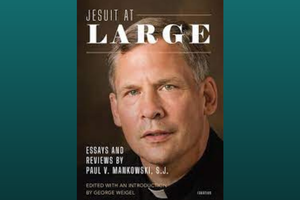‘Ancient, Ever New’: Read Homilies From Father and Bishop Ratzinger
BOOK PICK: ‘On Love’ highlights how Pope Benedict XVI consistently brought God’s word to his flock in a thoughtful way.

ON LOVE
Selected Writings
By Joseph Ratzinger/Pope Benedict
Ignatius Press, 2021
215 pages, $15.95
“I knew you were going to say that.”
Those words are not immediately obvious as a compliment. Indeed, they could be taken (or intended) to mean that you’re predictable, hackneyed … always saying the same thing … a one-trick pony.
But that phrase can also be taken (and unwittingly intended) as a compliment. It expresses the quality of a good leader, and especially of a good priest or bishop — namely, that he is predictable, not capriciousness. When people can “predict” what he will say or do, it means that he’s living in a consistent way and behaving fairly toward all his people. He’s consistent in what he says, how he acts, and how he treats people.
This came to mind in reading On Love, Ignatius Press’ latest collection of Joseph Ratzinger’s homilies. Not that I knew everything he was going to say, of course. Rather, I mean that there are no surprises in his words. These homilies are consistent with everything he has taught for decades. And that’s a good thing to say about a priest and bishop.
The homilies included in this little volume span the years 1970 to 2003 (so, all from Father and Bishop Ratzinger, none from Pope Benedict), from his time in Germany and Italy, and to all kinds of congregations (in cathedrals, parishes, monasteries, convents). They show his clear, consistent teaching over many years as a priest and bishop — years that have at the same time been some of the most confused and unpredictable for the Church.
The book arranges his homilies not chronologically but by liturgical season, an ordering that only emphasizes the constancy of Ratzinger’s thought and teaching. If the book didn’t provide the date and place of the homilies, you would be hard-pressed to locate the year of each one. Such is the consistency of thought that Joseph Ratzinger has evidenced throughout his priesthood.
Even better, St. Augustine’s phrase “Ever ancient, ever new” captures the sense one has in reading this compilation. The homilies are “ever ancient” because Ratzinger always draws on the Church’s Tradition. He’s not interested in inflicting clever insights or groundbreaking theology on the People of God. Rather, like a good father, he wants to bring the Church’s perennial teaching to God’s children here and now. He wants to hand on to them their proper inheritance.
The homilies are “ever ancient” also because he returns to certain themes of his ministry again and again: the eyes of the heart, the meaning of freedom, the mixed blessing of technology, the fear of God as a competitor, the loss of reverence for God as Creator … and so on. His returning to certain themes is a matter not of his being constrained in his thought, but of his knowing what the people of his time need to hear.
At the same time, these homilies are “ever new.” They are never dry reflections on Scripture. He is never just repeating himself. He is always applying Scripture to a specific situation, bringing God’s word to bear in a particular setting and/or occasion.
Indeed, this is the proper understanding of “ever new.” When clerics make things “relevant,” it is typically at the cost of the integrity of Scripture and doctrine. In Church-speak, “relevant” usually means brand-new, novel, different than before. Thus it also means time-bound and soon to be irrelevant. Only what is rooted in eternity can really be “ever new.”
The homilies show that Ratzinger (contrary to his reputation) is not only a great mind but a great pastor. He knows both the depth of the Tradition and how it ought to be applied to a particular congregation or occasion. Even such a mundane event as the blessing of tractors elicits from him a beautiful reflection. On such an occasion most of us would slouch into platitudes. But Ratzinger takes the occasion seriously and speaks wonderful words on the meaning of creation and man’s cooperation with the Creator.
He always demonstrates a profound respect for each group he addresses, for the various devotions and occasions. From the above-mentioned words to farmers, to his reflection at Fatima, to his summary of St. Josemaría Escrivá’s life and spirituality, he always shows reverence for the people and the occasion for his preaching.
On Love of course contains great one-liners and turns of phrases that we have come to expect from Ratzinger: “Freedom is a daughter of grace. … When we forget God, things become mute. … A civilization without contemplation cannot last long.” As with Chesterton’s, his lines can stand on their own. But they have even more impact when we read them in context and see how he arrives at them.
This is great spiritual reading for laity and clergy alike. But clergy in particular will benefit not only from the content, but also from the style.
Here is another set of lessons on how to preach, how not to shortchange Scripture or the people in our preaching, how to bring about that happy marriage of God’s word and his children.

















